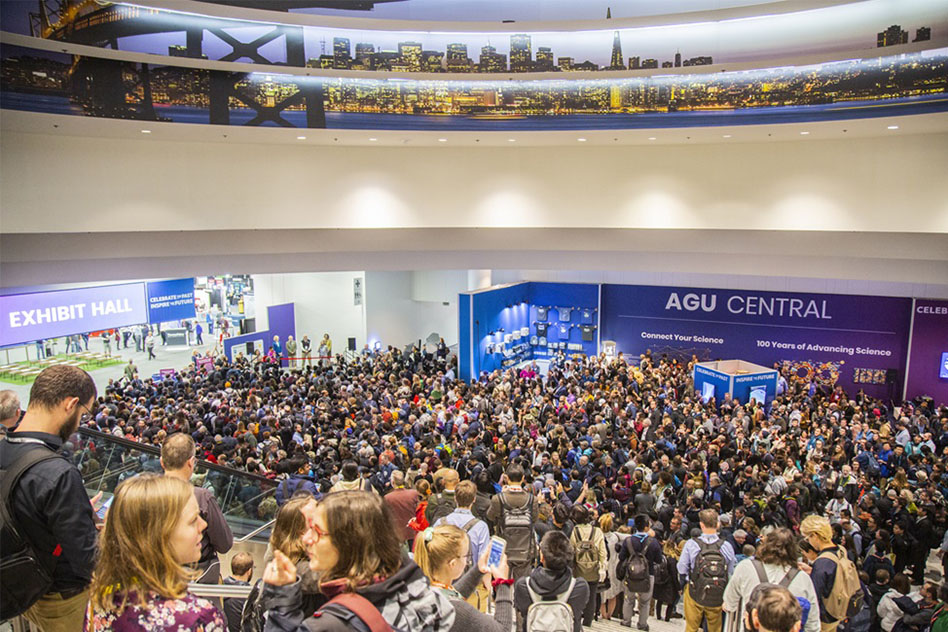
The preeminent conference for the advancement of Earth and space sciences, the AGU (American Geophysical Union) Fall Meeting draws more than 25,000 attendees from over 100 countries each year to share research findings and identify innovative solutions to complex problems. Organized around the theme “Science Leads the Future,” this year’s AGU Fall Meeting will take place in Chicago and online on December 12 - 16.
Among those researchers will be 15 co-authors of oral and poster presentations, and conveners of conference sessions, who are core members or faculty affiliates of the MIT Joint Program on the Science and Policy of Global Change. Listed below—links to complete abstracts, names of Joint Program co-authors or conveners (in bold for lead authors or conveners)—their presentations and sessions span multiple Joint Program research focus areas, including Earth systems, managed resources, energy transition, and multi-sector dynamics.
Categorized by primary research focus area, these linked presentations and sessions highlight recent findings by Joint Program researchers and their co-authors on tools and pathways to assess and reduce regional and global risk.
Earth Systems
These presentations explore changes and risks to the Earth’s interconnected land, ocean, atmosphere and biosphere systems.
- Sensitivity Analysis and Uncertainty Quantification of E3SM Methane model using Machine Learning (Sandeep Chinta, Xiang Gao)
- The Climate Consensus Network - Creating Capacity for Climate Outreach Within our Universities (C. Adam Schlosser)
- Increase in global and East Asia Nitrogen trifluoride (NF3) emissions inferred from atmospheric observations (Ronald Prinn)
- Quantifying the impact of terrestrial carbon and nutrient discharge on the global-ocean carbon cycle over seasonal-to-interannual timescales (Stephanie Dutkiewicz)
- Advances in Simulating the Global Spatial Heterogeneity of Air Quality and Source Sector Contributions: Insights into the Global South (Sebastian Eastham)
- Background nitrogen dioxide (NO2) over the United States and its implications for satellite observations and trends: roles of aircraft, wildfires, and nitrate photolysis (Sebastian Eastham)
- Health impacts of smoke exposure in South America: Increased risk for populations in the Amazonian Indigenous territories (Sebastian Eastham)
- Using Quantile Regression to Detect Regional and Global Signals in Atmospheric Mercury Trends (Noelle Selin)
- Impact of climate variability and change on the ozone response to NOx emissions reductions (Sebastian Eastham and Noelle Selin)
- Large Mitigation Potential of Smoke PM2.5 in the US from Human-Ignited Wildfires and Agricultural Fires (Noelle Selin)
- Exploring Injection Locations for Stratospheric Aerosol Geoengineering to Maximize Particle Lifetime in the Stratosphere (Sebastian Eastham)
Managed Resources
These presentations examine changes and risks to managed agriculture and water systems.
- Impacts of future climate change on global food production: perspectives from model simulations of multiple emission scenarios (Xiang Gao, C. Adam Schlosser, Andrei Sokolov and Angelo Gurgel)
- Economic Evaluation of Water Resources Projects under Climate Change Uncertainty: Demonstration for Investment in Lesotho (Kenneth Strzepek)
Energy Transition
This presentation focuses on global projections of the future energy mix under different policy scenarios amid a global transition to low- and zero-carbon energy sources.
- Implications of Policy Design and Socioeconomic Uncertainties for Energy Transitions and Sectoral Responses (Jennifer Morris and Angelo Gurgel)
Multi-Sector Dynamics
These presentations and sessions investigate potential scenarios, risks and transition states of interconnected Earth and human systems.
- Climate Extremes and the Future of the Power Sector in the U.S. Heartland: A Multi-Sector Dynamics Perspective (Angelo Gurgel, C. Adam Schlosser, Mei Yuan, Xiang Gao, Jennifer Morris and John Reilly)
- Quantifying the Compounding, Co-Existing Nature and Inequities of Physical and Transition Risks Across the United States (C. Adam Schlosser, Cypress Frankenfeld, Sebastian Eastham, Xiang Gao, Angelo Gurgel, Jennifer Morris, Sergey Paltsev and John Reilly)
- A new scenario framework for the Multi-Sector Dynamics and related communities (Jennifer Morris)
- Multi-sector Dynamics: Science & Modeling for Societal Transformation I Oral (Jennifer Morris)
- Multi-sector Dynamics: Science & Modeling for Societal Transformation II Online Poster Discussion (Jennifer Morris)
- Multi-sector Dynamics: Science & Modeling for Societal Transformation III Poster (Jennifer Morris)
Photo: AGU Fall Meeting Central Exhibit Hall (Source: AGU)

